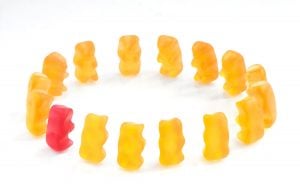Supreme Court Clerks Showcase The Only Diversity That Doesn’t Matter
SCOTUS clerkships may be elite, but they're also mighty white.
 For better or worse, federal clerkships are the brass ring of the legal profession, designed to be an indicia of elite legal thinking. And a Supreme Court clerkship, well, that’s just ultra elite.
For better or worse, federal clerkships are the brass ring of the legal profession, designed to be an indicia of elite legal thinking. And a Supreme Court clerkship, well, that’s just ultra elite.
You’d think, given how essential these clerkships are for designating the next generation of legal superstars, the Court would be especially sensitive in making sure they reflect the diversity of the profession. Well, you’d be wrong!
As reported by David Lat, the October Term 2022 SCOTUS clerkship ranks are not nearly as diverse as they should be:

Early Adopters Of Legal AI Gaining Competitive Edge In Marketplace
The OT 2022 class contains 38 clerks—four for each active justice, plus one each for retired Justices Anthony Kennedy and Stephen Breyer (who will work in the chambers of an active justice in addition to assisting their retired bosses with various projects). Of the 38 clerks, 25 are men and 13 are women, making for a class that’s 66 percent male and 34 percent female.
That is bad, like really bad. Lat estimates it is the least gender diverse class since at least 2017. But the problem is truly supercharged when you realize law school classes have WAY more gender parity. In fact, there are more women than men in law school — and that’s been the case for a number of years. It’s like the justices aren’t even trying. And really, why would they? A lifetime appointment means never having to say you’re sorry.
Oh, but don’t worry — gender diversity is *far* from the only diversity issue this class of clerks has. It’s also mighty white, to the tune of 84 percent.
Sponsored

The Business Case For AI At Your Law Firm


Early Adopters Of Legal AI Gaining Competitive Edge In Marketplace

Navigating Financial Success by Avoiding Common Pitfalls and Maximizing Firm Performance

Is The Future Of Law Distributed? Lessons From The Tech Adoption Curve
Like with the gender issues, this is whiter than law school classes generally (for example, the incoming class of 2021 had 34.7 percent people of color). And don’t start making some bullshit (read: racist) justification that sure, law schools generally might be more diverse than this clerk class, but SCOTUS clerks are the best of the best and if that’s not as diverse as the woke mob wants then shrug emoji. Because the best law schools are EVEN MORE diverse than the average: Yale Law is at 54 percent students of color, Harvard Law is at 56 percent students of color. In making clerk hiring decisions, justices are not at the mercy of law school admissions — this is a choice being made.
Now for the academic diversity issue, which, tbh, isn’t actually diversity because Tier 2 law school grads aren’t a protected class. And it’s also true that elitism is a feature, not a bug of the legal profession. But don’t worry, there’s still plenty to get upset about.
Anyway, the clerks for the OT ’22 term come from just 5 percent of law schools. The breakdown is as follows:
- Yale (12)
- Harvard (8)
- Stanford (7)
- Chicago (3)
- UVA (2)
- Scalia GMU (2)
- Penn (1)
- Michigan (1)
- Texas (1)
- Notre Dame (1)
Do you see it? The lowest ranked law school that placed clerks this term managed to place multiple people. Of course, I’m talking about ASSLaw — otherwise known as George Mason University’s Antonin Scalia Law School, for the uninitiated. The school has decided to carve out a place for itself as the conservative law school (hmm, what *does* UChicago think!) and the most conservative justices on the Court (Alito and Thomas) are lapping that shit up. All under the guise of viewpoint diversity, which is kinda problematic.
Sponsored

Legal AI: 3 Steps Law Firms Should Take Now

Is The Future Of Law Distributed? Lessons From The Tech Adoption Curve
As my colleague Joe Patrice noted:
And don’t be deliberately obtuse: it’s not a “private schools are better” argument. There are a number of better public law schools that don’t have any clerks on the Court, see, e.g., Berkeley, UCLA, Florida, Minnesota, UNC, Alabama, Iowa, Georgia. But Republican judges say they’re looking for ideological purists, and that’s a thing ASSLaw has to spare.
And everyone knows that’s all they bring to the table.
Honestly, the FedSoc kids at all the top law schools should be insulted. Are the Columbia Law FedSoc members not intense enough? Are there not enough conservatives at Duke these days?
But regardless of what we think of the embarrassing levels of diversity in this clerk class, these folks will still bear the mark of SCOTUS. And that’ll give them a substantial leg up for the rest of their career.
 Kathryn Rubino is a Senior Editor at Above the Law, host of The Jabot podcast, and co-host of Thinking Like A Lawyer. AtL tipsters are the best, so please connect with her. Feel free to email her with any tips, questions, or comments and follow her on Twitter (@Kathryn1).
Kathryn Rubino is a Senior Editor at Above the Law, host of The Jabot podcast, and co-host of Thinking Like A Lawyer. AtL tipsters are the best, so please connect with her. Feel free to email her with any tips, questions, or comments and follow her on Twitter (@Kathryn1).







